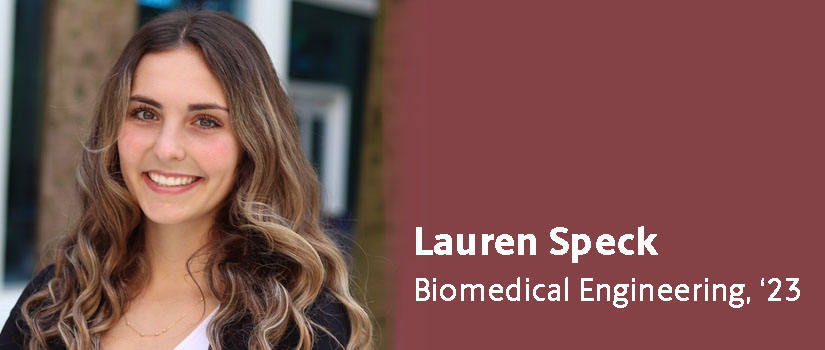Biomedical engineering senior Lauren Speck arrived at the University of South Carolina in the fall of 2019 from Freehold Township, New Jersey. She developed an interest in engineering when her grandmother was diagnosed with Parkinson’s disease, a progressive disorder that affects the nervous system, when she was young. Combined with her interests in science and math, Speck’s personal experience caring for her grandmother ultimately led her to pursue a degree in biomedical engineering.
She will graduate in May and begin her professional career as a life sciences consultant. This will allow her to contribute to the improvement and implementation of better healthcare technology for laboratories and businesses globally.
Why did you decide to major in biomedical engineering?
After caring for my grandmother who suffered from Parkinson’s disease, I desired to be on the forefront of engineering improved healthcare technology. This can be in terms of the creation of new drugs, better medical devices, or improving overall healthcare service and management. As a biomedical engineering major, I was able to begin contributing to these goals through my internship experience with the pharmaceutical company Merck along with my role in Dr. [Melissa] Moss’s lab.
What do you enjoy most about attending the College of Engineering and Computing?
I enjoy the diverse range of experiences and have been able to dip my toes in a variety of fields and potential career options, including research and industry. In the biomedical engineering department, we take a wide variety of courses focused on biology, chemistry and mathematics, such as anatomy and bioinstrumentation. This has helped me pinpoint my interests and finalize my plan following my graduation this May.
I have also been able to lead student organizations on campus such as the co-ed professional engineering fraternity, Theta Tau, and the biomedical engineering society, which has cultivated my communication and management skills within my time as an undergraduate student.
What has been your most meaningful experience at the college?
My most meaningful experience has been taking biomedical engineering laboratory classes under Dr. [Silke] Henrich. In this class, I was able to develop my lab skills while working on projects from cell culturing to identifying differing electrical activities in the brain through electroencephalogram (EEG) technology. Collaborating for writing reports with my lab group also allowed me to develop technical writing and teamwork skills, which are valued to potential employers after college. I’m now a teaching assistant for the course.
What skills have you learned or developed during your time at the college?
I have become very adaptable to changing environments. This stemmed from working in a variety of different environments - from my interest in the Gamecock Consulting Club through the Darla Moore School of Business to working in Dr. Moss’s lab focused on Alzheimer’s Disease. By exploring many different interests and joining organizations in addition to the biomedical courses, I have become flexible to different types of work. Overall, these diverse experiences and environments have broadened my knowledge of engineering and business, while preparing me for a changing workplace environment following graduation.
I have developed great communication skills. Through my courses, case competitions, laboratory presentations and student organizational positions, I have learned how to effectively speak to a large group and gauge attention. This is a crucial skill as an employee to convey important information in an interesting way. I am thankful for the opportunities to develop these skills within the CEC over the last four years.
How have CEC faculty mentored or helped you?
The biomedical engineering faculty have been invaluable resources throughout my four years. They have provided hands-on coursework, networking connections and research opportunities.
How have your internships and research experiences helped enhance your understanding of biomedical engineering?
My internship with Merck enhanced my understanding of chemical and biomedical courses. Specifically, I saw large-scale vaccine manufacturing which included cell growth. We learned about this in our kinetics course. Seeing concepts we learned in the classroom applied to the industry has led to a deeper understanding of the real-world impact and purpose of what we are learning.
What do you enjoy most about being a member of Theta Tau?
I currently serve as president and enjoy this role because I can connect our organization to other professional organizations, such as business and pre-med fraternities. I also oversee general events ranging from brotherhood hangouts to philanthropy efforts. We not only spend quality time with friends, but we also improve academically and give back to the surrounding community through service.
Why is engineering and computing important to society?
Engineering and computing are essential to society as it encapsulates the forefront of technology development. As the world continues to change, humans need to adapt and with this comes a desire to create. As engineers, we work to implement new ideas into society to improve human response to conflict and change.
